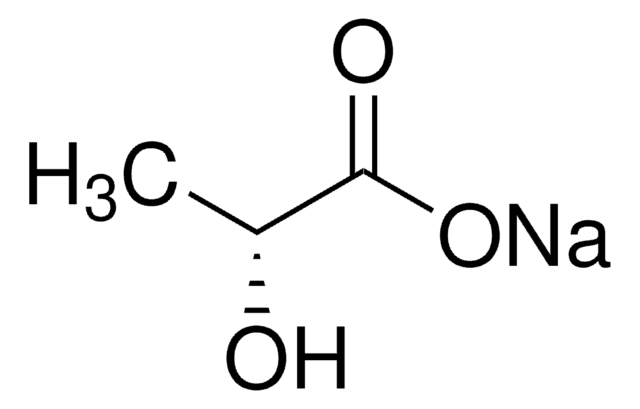L6402
L-(+)-Lactic acid
BioXtra, ≥98% (titration)
Synonym(s):
(S)-2-Hydroxypropionic acid, Sarcolactic acid
About This Item
Recommended Products
product line
BioXtra
Quality Level
Assay
≥98% (titration)
impurities
≤0.005% Phosphorus (P)
≤0.1% Insoluble matter
ign. residue
≤0.1%
solubility
H2O: 1 M at 20 °C, clear, colorless
anion traces
chloride (Cl-): ≤0.05%
sulfate (SO42-): ≤0.05%
cation traces
Al: ≤0.0005%
Ca: ≤0.0005%
Cu: ≤0.0005%
Fe: ≤0.0005%
K: ≤0.005%
Mg: ≤0.0005%
NH4+: ≤0.05%
Na: ≤0.005%
Pb: ≤0.001%
Zn: ≤0.0005%
storage temp.
2-8°C
SMILES string
C[C@H](O)C(O)=O
InChI
1S/C3H6O3/c1-2(4)3(5)6/h2,4H,1H3,(H,5,6)/t2-/m0/s1
InChI key
JVTAAEKCZFNVCJ-REOHCLBHSA-N
Looking for similar products? Visit Product Comparison Guide
Related Categories
Biochem/physiol Actions
Signal Word
Danger
Hazard Statements
Precautionary Statements
Hazard Classifications
Eye Dam. 1 - Skin Corr. 1C
Supplementary Hazards
Storage Class Code
8A - Combustible corrosive hazardous materials
WGK
WGK 1
Personal Protective Equipment
Choose from one of the most recent versions:
Already Own This Product?
Find documentation for the products that you have recently purchased in the Document Library.
Customers Also Viewed
Protocols
Separation of L-(+)-Lactic acid, analytical standard; D-(−)-Lactic acid, 93-107%
Chromatograms
application for HPLCapplication for HPLCOur team of scientists has experience in all areas of research including Life Science, Material Science, Chemical Synthesis, Chromatography, Analytical and many others.
Contact Technical Service







